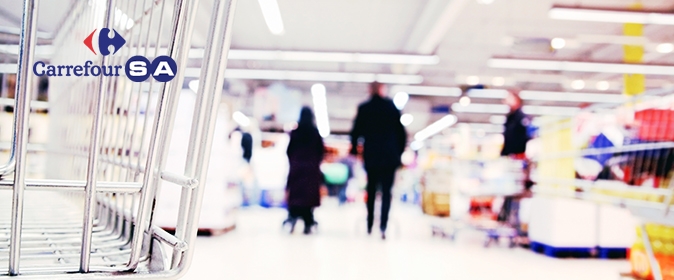Improving security and efficiency with Suprema fingerprint terminals across Carrefour supermarkets in Turkey
19 Aug 2015
The Carrefour group is the leading retailer in Europe and the second-largest retailer in the world, employing 381,227 worldwide. Suprema’s biometric technology provided the accuracy to handle a large user base with quick matching results. BioEntry Plus, an IP fingerprint terminal, has been selected and a total of 500 terminals are used to accommodate 5,000 employees. The terminal offers performance of 2,000 matches per second with a capacity of 50,000 logs. The device also features a minimal profile for multiple installation options at various placements.
Background information
Carrefour is a French multinational discount retailer and one of the largest hypermarket chains in the world. The Carrefour group is the leading retailer in Europe and the second-largest retailer in the world, employing 381,227 worldwide. The group serves over 100 million customer households worldwide and performs 12.5 million checkouts every day in its stores. In Turkey, Carrefour operates in a joint venture with the Sabanci Group under the name Carrefour SA. After opening its first store in Istanbul in 1993, Carrefour SA currently operates more than 240 stores with more than 5,000 employees working in supermarkets around Turkey.
Challenges
In order to manage 5,000 employees working at various locations, the HR division of Carrefour SA relied upon RF card-based authentication for its access control and time & attendance system. The division ran into a number of challenges while trying to efficiently manage the workforce due to issues related to the nature of RF-based systems. The card-based system had increasing cost issues due to lost or stolen cards. While replacement cards required monetary and time resources that added to the inefficiency, the biggest issue came with card sharing by employees. Card sharing resulted in ‘Buddy Punching’ which led to manipulation of time & attendance records by the employees. Also it opened the door to possible card duplication and security threats by unauthorized access to secure protected areas with a stolen identity.
Solution
Meyer, Suprema’s local partner in Turkey, has presented the solution of implementing biometrics into the access control and time & attendance system to overcome the issues. By using biometrics, the system is able to benefit from the advantages of true identity and prevent unwanted behavior such as buddy punching. Biometrics can’t be lost or copied and the security is significantly improved by truly identifying all those that authenticate through the system. Meyer recognized that the transition to biometrics required hardware and algorithms that ensure high performance due to the increased data size associated with biometrics. They proposed Suprema biometric readers for its renowned reliability and performance. Suprema’s biometric technology provided the accuracy to handle a large user base with quick matching results. BioEntry Plus, an IP fingerprint terminal, has been selected and a total of 500 terminals are used to accommodate 5,000 employees. The terminal offers performance of 2,000 matches per second with a capacity of 50,000 logs. The device also features a minimal profile for multiple installation options at various placements.
The Results.
The deployment of 500 BioEntry Plus fingerprint terminals had an immediate effect on the efficiency of work shift management. It prevents ‘Buddy Punching’ and improves the reliability of the data. From the employees’ perspective, the use of fingerprint means that they no longer have to carry cumbersome employee cards and do not have to worry about damaging or losing the card, which enhances convenience. Also, not having a physical card means that any HR changes can be made without needing to worry about reclaiming the cards and changes are instantly reflected to the system remotely.
Suprema Inc.
Website
T: 0800 3688123
14F Parkview Tower, 248 Jeongiail-ro
Bundang-gu
Seongnam-si
13554
Gyeonggi-do
Korea, Republic of


